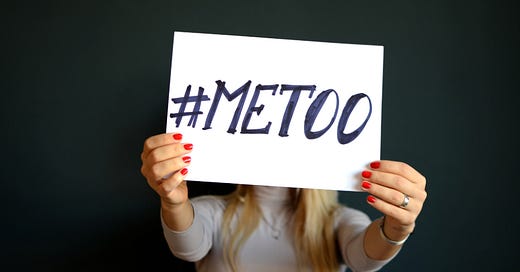
Last year, an important cultural revolution began in this country — one that transcended American politics and rattled dominant industries to their very core. Its origins stemming from a couple of groundbreaking exposés on Harvey Weinstein that detailed years of serious sexual misconduct by the famed film producer (and his exhaustive efforts to silence his accusers), what became known as the #MeToo movement built up steam and led to the airing of countless cases of egregious acts by powerful men.
Emboldened by the watershed moment, many women (and even some men) bravely came forward with their stories of past sexual harassment and abuse. Serious, credible accusations led to investigations, firings, and even some criminal charges against high-profile individuals including high-ranking politicians, A-list celebrities, national journalists, and corporate CEOs. The political leanings of the accused were refreshingly of no consequence. Liberal or a conservative. Democrat or Republican. It didn't matter because the issue was one of personal conduct.
The message was clear and focused: Accusers must be heard. Their claims must be taken seriously and looked into. And those guilty of wrongdoing must be held accountable.
At the time, I called this societal reckoning a very good thing for the cultural fabric of our nation, and I still believe that. After all, the purpose of #MeToo has been to empower those who've been preyed upon, to shed light on the truth, and to seek justice. But I was concerned at the time that like many other honorable and important movements, it would eventually be co-opted and led astray by political opportunists and even well-meaning reactionaries looking to bolster a broader narrative.
In other words, I worried that #MeToo would become less about justice, and more about justification.
Those concerns have unfortunately been validated during the epic saga of Brett Kavanaugh's Supreme Court nomination, and the charges levied against him by Christine Blasey Ford. As we all know, Ford says she was sexually assaulted by Kavanaugh at a party when the two were in high school, and her sworn testimony in front of the Senate Judiciary Committee was felt by many (including me) to be genuine and quite compelling.
As far as many were concerned, that was enough. Case closed. Kavanaugh could not, by any moral reasoning or rationale, be confirmed for the Supreme Court. And if he somehow were to be, it would be a slap in the face of women everywhere, and a national disgrace of historic proportions.
In fact, a lot of people — many of them waving the #MeToo banner — had reached this conclusion well before Ford had ever taken the stand. Hearing her tell her story in person, and tell it in the way she did, only reinforced their steadfast belief in Kavanaugh's guilt.
It didn't really matter what Kavanaugh had to say after that. He came out swinging in his subsequent testimony, angrily (and justifiably) blasting how the process was being handled in DC and covered by the media. He expressed the pain that he and his family had been going through, and continued to proclaim his innocence.
His critics, doubters, and political opponents framed the display of righteous indignation as further proof of his guilt and unfitness for the bench, but it's safe to say that had he presented himself dispassionately, many of the same people would have cast him as callous and uncaring. Again, more proof of guilt. He really couldn't win.
What also didn't matter was the absence of any corroborating evidence to support Ford's claim. The witnesses she named (including friends of hers) couldn't validate her story, nor even place her and Kavanaugh together at any party. Ford couldn't remember who brought her to the party, who brought her home from the party, or when and where the party actually was.
None of this is to say that things didn't go down exactly as she says. They may have. None of us know for sure.
A hazy memory is perfectly understandable based on the amount of time that has passed. And if you add in the emotional trauma one would surely suffer from such an assault, the memory gaps are certainly feasible. It could possibly even be used o explain her evolving account of the incident.
But at bare minimum, the fact that there's no evidence to support an accuser's claim should at least be considered when deciding on the fate of the person being accused. Unfortunately, a lot of people aren't willing to even entertain such a consideration.
If you've spent any time on social media over the past couple weeks, you've probably seen the battle-lines drawn: Either you stand with women or you stand against them. Either you support victims or you support their attackers. There's no room for context, nuance, or even a presumption of innocence in how such statements have been applied.
As someone who has tried to view this situation with an open mind and with the sensitivity it genuinely deserves, I've been unable to identify the kind of binary choices that so many others are insisting upon. To me it keeps going back to the concept of blind justice.
The presumption of innocence is more than just a vital component of our legal system. It's also a basic human right. It's part of the foundation of our democracy. And by disregarding that right for the sake of societal solidarity or a broader cultural theme, a vital component of the #MeToo movement is also being jeopardized: the pursuit of truth.
Perception is a powerful lure, and many perceive Brett Kavanaugh as being guilty of what he's being accused of. But the goal when dealing with issues as important as sexual abuse, victims' rights, and human rights, should always be the truth, not perception.
Perception is what let Harvey Weinstein, Matt Lauer, and many other powerful men get away with their egregious acts for as long as they did. Truth is what put them out of business.
Believe me, I get that the truth is a hard sell these days — especially with the current state of our politics — but society must rise above politics and preconceived notions on the things that truly matter. Some issues must command our objectivity. And if we can't even be objective enough to look at evidence earnestly, and insist upon a minimum burden of proof being met before branding someone a sexual assailant, we lose as a people.
What I'm seeing right now isn't #MeToo. #MeToo has played an important, truth-driven role in our culture over the past couple of years. I'm hoping it continues to do so in the future.












